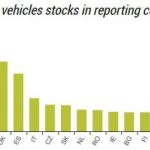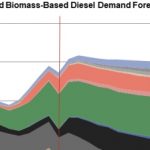UCO (Used Cooking Oil) is a feedstock for biofuels. In 2023, European countries consumed close to seven million tonnes of UCO for biofuels. This is four times the continent’s maximum potential for supplying it domestically, so the rest comes from imports, mostly from China, Malaysia and Indonesia. The vast majority is blended for biodiesel to use in cars and trucks. UCO accounted for one third of conventional biodiesel feedstocks and a quarter of … [Read more...]
Hydrogen too expensive for Trucking? 85% of the cost is getting it to the pump
Hydrogen can be a clean fuel for heavy duty trucking. The target price for rapid adoption is $4-$5/kg, yet right now hydrogen costs $13-$16/kg at refuelling stations in California. Cutting the cost of making the hydrogen is proving slow. But Ted McKlveen and Bav Roy at Verne, writing for WEF, show that the production only accounts for 15% of the cost at the pump. Roughly 50% of the cost is from running the pump station (equipment like compressors … [Read more...]
Zero-Emission Trucks can be cost competitive by 2035 (and much sooner depending on size and range)
Zero-emission medium- and heavy-duty vehicles (MHDVs) such as battery electric and hydrogen fuel cell electric, in every size and range category, can be cost competitive with their diesel equivalents by 2035. In several of those categories it can be much sooner – within the next six years - explains Julia Thomas at NREL. Researchers there have modelled how the total cost of driving for zero-emission and diesel MHDVs can evolve over time under … [Read more...]
Investors beware: per € of revenue, truckmakers are more carbon intensive than oil, steel, cars (but not coal!)
Truckmakers are a more carbon intensive investment, per € of revenue, than oil, steel and cars. The only major sector that's worse is coal mining, says a new study by T&E. For investors that are counting the emissions of their investments, this will become clear when truckmakers are forced to report their Scope 3 emissions next year. Truckmakers therefore risk losing access to these investors. Until now, truckmakers have got away with it … [Read more...]
2023: a year of climate backlash? Or a show of Europe’s green resilience
Looking at the mainstream media 2023 seemed to be a year of climate backlash, but the real story was Europe’s green resilience, writes William Todts at T&E. Though support in the German coalition for 100% electric vehicles by 2035 started to unravel, it didn’t: allowing combustion cars to keep running after 2035 on 100% e-fuels should change little given there’s no way such vehicles, if they ever get built, could compete with EVs, says Todts. … [Read more...]
Europe’s big Hydrogen ambitions won’t deliver. Stick to ammonia-fertiliser, refining, shipping, aviation (maybe later)
Europe’s hydrogen ambitions need a reality check. The EU’s goal to produce and import 20m tonnes of clean hydrogen by 2030 is now widely seen as completely unrealistic, says William Todts at T&E. The business case is not good enough because of the high costs that aren’t coming down as hoped. It’s why only 4% of hydrogen projects get financed. Far better to focus on no regrets, low infrastructure hydrogen applications for ammonia-fertiliser, … [Read more...]
Poorly defined “efficiency” incentives birthed the SUV. Beware the same mistake with “clean energy” jobs, “domestic” batteries + more
Financial support for the transition needs clear and carefully chosen definitions of what qualifies for that support. Getting it wrong leads to unintended consequences, some which may not reduce emissions, explains James Sallee at the Energy Institute at Haas. Ever wondered why SUVs and big cars proliferated after the 1970s in the U.S. (and are on roads all over the world now)? The 1970s oil crisis triggered new rules that penalised fuel … [Read more...]
If most truck journeys are less than 300 miles the E-Truck revolution can happen now
What proportion of trucks today could go electric? That’s the question Emily Porter at RMI has asked for California and New York. The answer is 65% of medium-duty trucks and 49% of heavy-duty trucks. Those are very encouragingly high numbers. RMI’s definition of “electrifiable” is if they travel fewer than 300 miles between trips to their home bases. The study gathered real data on how freight trucks are driven today. Clearly, a large number of … [Read more...]
Biomethane for decarbonising transport: the Swedish example
Biomethane has a critical role to play in the decarbonisation of transport, particularly long-distance trucks and ships, where electrification is more difficult and expensive. Angela Sainz Arnau at the European Biogas Association explains that biomethane represents one of the lowest greenhouse gas intensive pathways when the whole emissions lifecycle is measured. However, when nations implement bans on internal combustion engines to cut the use … [Read more...]
Clean transport in Europe: key trends to watch out for
T&E’s quarterly trends series gives a snapshot of the key developments that will define the future of clean transport in Europe. And what Europe does – given it wants to lead this field – should influence what happens worldwide. T&E’s Thomas Earl brings attention to four issues. First, proven progress in this major sector makes it a contender for a significant role in Europe’s new industrial strategy. It ranges from battery and … [Read more...]
New cooling system for inverters brings electric Heavy-Duty Trucks closer
39% of greenhouse gas emissions in the transport sector comes from heavy-duty trucks. Commercial batteries struggle to deliver enough power to make electrification feasible for heavy-duty applications. Rebecca Martineau at NREL explains how a working prototype, developed with the heavy machinery manufacturer John Deere, is now getting a 378% increase in power density. The key to the innovations rests on a state-of-the-art thermal management … [Read more...]
Don’t commit to Hydrogen pipelines yet? Trucks can do the same job more flexibly
Could trucks be a better way to transport (and even store) hydrogen than pipelines? Yes, says a research team led by the MIT Energy Initiative (MITEI), mainly because of the flexibility they offer particularly in the early stages of the hydrogen roll-out. Kathryn O'Neill at MIT explains the findings. A pipeline can take 10 years to build, during which time the locations where the supply and demand must be met are likely to have moved, given the … [Read more...]
Aviation should be given target dates for zero-emissions. It’s working for cars and trucks
The French government’s decision to ban some short-haul flights if there is a rail alternative under two and a half hours is only symbolic, says Andrew Murphy at T&E. It would reduce French aviation emissions by only 0.8%. Expanded to rail journeys under five hours and it’s still only 4.5%. Long-haul flying is the much bigger problem, but the resulting emissions are outside of France’s current climate target. Instead of just talking about … [Read more...]
Clean Trucks are coming: a review of battery, hydrogen, synthetic fuels and more
New EU fuel efficiency rules are forcing truck makers into a race to get their low emission vehicles onto the roads. From 2025, newly registered trucks must have 15% lower emissions, and from 2030 it’s 30%. Battery-electric drivetrains are most likely to dominate, assisted in their evolution by the assured progress and charging infrastructure of EVs. Hydrogen fuel cells and synthetic fuels are also in the game, though hindered by the inevitable … [Read more...]
Biofuels vs Hydrogen: which can fuel aviation, shipping, trucks?
The positive signals coming from EV sales and charge points contrast with the lack of progress in finding alternative fuels for aviation, shipping and trucks. Cornelius Claeys runs through the prospects for biofuels and hydrogen to power long-haul transport. Biofuels are already used as a substitute for fossil fuels, and EV uptake will usefully free them for fuelling heavy transport. But as decarbonisation ambitions rise the pressure on scarce … [Read more...]















